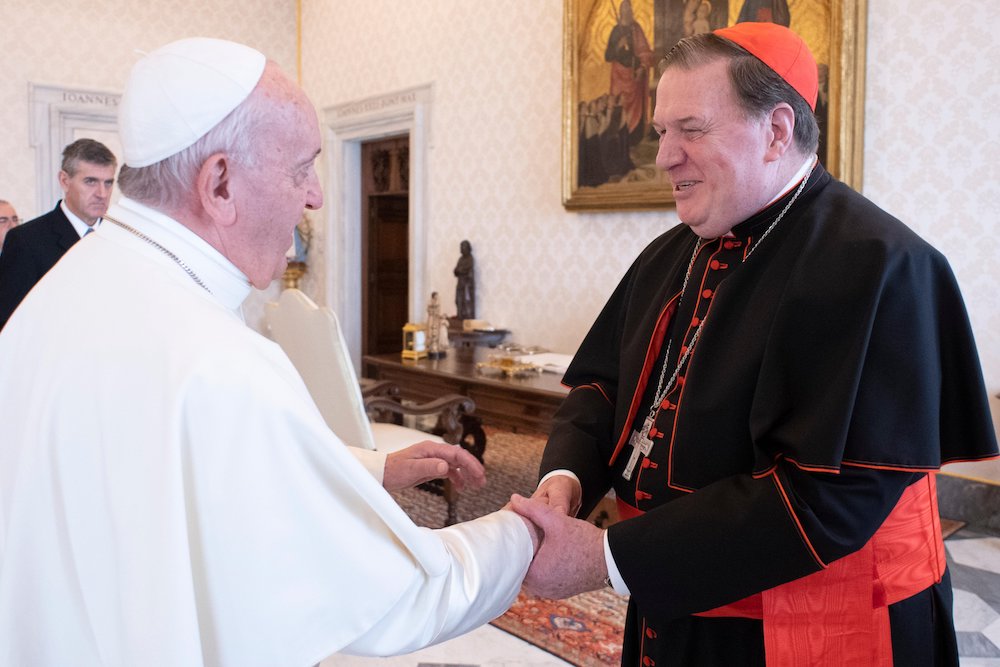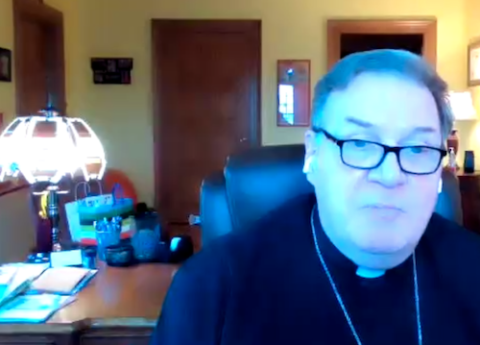
Pope Francis greets Cardinal Joseph Tobin of Newark, New Jersey, during a meeting with U.S. bishops from New Jersey and Pennsylvania in the Apostolic Palace at the Vatican Nov. 28, 2019. In March 2021, Francis named Tobin a member of the Congregation for Bishops, the office that advises the pope on the nomination of bishops. (CNS/Vatican Media)
Church leaders, including those in the United States, uncomfortable with Pope Francis' emphasis on mercy and an attentiveness to the voices of those on the peripheries should reexamine their skepticism, according to Cardinal Joseph Tobin of Newark, New Jersey, who says such priorities are here to stay.
"The election of Pope Francis opened up the rest of the world to the rich theological foment of the church in Latin America, with its strong sense of mission, encounter, the peripheries and mercy," said Tobin. "Many, including church leaders in this country, have found that shift to be uncomfortable."
The New Jersey cardinal's remarks came during a webinar on "Synodality and the Long Game of Pope Francis," delivered May 4 for Loyola University Chicago's Hank Center for the Catholic Intellectual Heritage annual Cardinal Bernardin Common Cause lecture.
Francis' priorities, said Tobin, are "not going away anytime soon." He went on to quote Pope John XXIII's opening address to the Second Vatican Council that "Christ prefers to make use of the medicine of mercy rather than of severity."

Cardinal Joseph Tobin of Newark, New Jersey, delivers Loyola University Chicago's Hank Center for the Catholic Intellectual Heritage annual Cardinal Bernardin Common Cause lecture virtually, May 4, 2021. (NCR screenshot)
Tobin identified Francis' focus on synodality as the vehicle by which Francis hopes to usher in this new focus on the need for mercy and listening to a range of voices for the church, saying that it is a "model of the church that the Lord expects for us in this millennia" and one that "will require changes on how we do and are church."
Drawing on his own experience of participating in five synods in his capacity as former superior general of the Congregation of the Most Holy Redeemer — three under Pope John Paul II and two under Pope Benedict XVI — Tobin said that Francis is "tuning up an engine" of the Synod of Bishops, a body first initiated by Pope Paul VI.
Synodality, the cardinal observed, is an often misunderstood "buzzword of this papacy." Tobin said that such a course must be guided by a church willing to journey together, recognizing the importance of conversion and the role that mercy plays in that process.
Tobin addressed criticisms of the synod process, such as those that have said it lacks or direction or "seeks to accompany, but not convert."
Advertisement
"A movement from severity to mercy is already quite a conversion," he countered. "Conversion requires going out."
The body of Christ, he went on to argue, must "go out" to the world around it. "What do healthy bodies do?" he asked. "They move."
"The ones who seemed most threatened," by such a process, said Tobin, are often the ones with the most fine-tuned grasps "of all the norms and canons."
"You can be the most knowledgeable mechanic on earth and still be a rotten driver," he said, offering a criticism of the rigorist mentality of those who have lambasted the pope and the openness of the synodal process.
"You can't show up with an imperialist attitude where you claim to have all the answers," he said, adding that "the acts of synodality do not look so much like sweeping dogmatic definitions as they do fine tuning how the Gospel is applied to the signs of the times."
Tobin, who first met Francis during the Synod of Bishops on the Eucharist in 2005 when he was then Cardinal Jorge Mario Bergoglio of Buenos Aires, has become one of his closest allies in the United States. In March, Francis named Tobin to the Congregation for Bishops, the Vatican's powerful body responsible for advising the pope on the selection of Catholic bishops around the globe.
"The acts of synodality do not look so much like sweeping dogmatic definitions as they do fine tuning how the Gospel is applied to the signs of the times."
—Cardinal Joseph Tobin
Since Francis' surprise election in 2013, Tobin said many Catholics have asked "why God would send us this shepherd from the southern hemisphere?"
"In early 2013, we thought it was about institutional reform," he mused. "In 2016, as Donald Trump, Rodrigo Duterte and other demagogues strutted into power, we could see clearly that Pope Francis, a man who witnessed the horrors of Argentina's Dirty War up close, could prophetically offer an alternative to this dark, brutalizing worldview."
"He could warn us that alliances with dictators have always ended with tears, death and the loss of the Gospel essence," Tobin added.
Eight years into Francis' papacy, through the process of conversion — a process Tobin said that even the pope has undergone — and through the instrument of synodality, Francis is helping to "integrate the head of the church and the rest of the body of Christ."
"We can't embrace people with just our heads," said Tobin, before asking: "Where are the outstretched arms of the body of Christ?"






